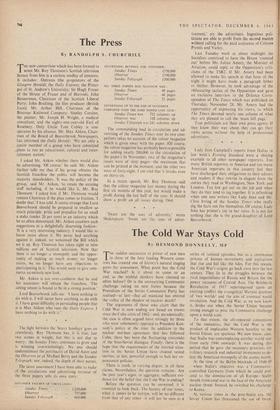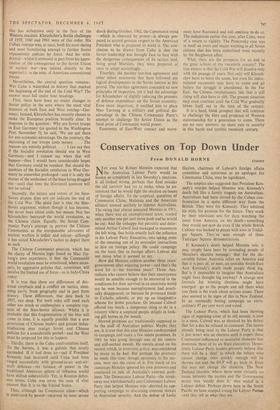The Cold War Stays Cold
By DESMOND DONNELLY, MP
THE sudden succession to power of new men in three of the four leading Western coun- tries has created one of history's natural staging posts for assessment. What point has the Cold War reached? Is it about to come to an end, as the wishful thinkers have claimer) so often before? Or is the unwearying CoMmunist challenge taking on new forms because the Presidium of the Soviet Communist Party has realised—at last—that all mankind, has entered the valley of the shadow of nuclear death?
The arguments of those who claim that the Cold War is now ending are based' on events since the Cuba crisis of 1962--and, paradoxically, the case is often argued most strongly by' those who were vehemently opposed to President Ken- nedy's policy at the time. In addition to the nuclear test-ban agreement that has followed Cuba. there has been the fluctuating crescendo of the Sino-Soviet dialogue. Finally, there is the hope that the requirements of the internal situa- tion in the Soviet Union have created vested inertias,'at last, powerful enough to halt her ex- pansionist policies.
There is truth, in ai ing degree. in all these claims. Nevertheless. the question remains: Are the past year's signs. in aggregate, sufficient evi- dence for the belief that the Cold War is ending?
Before the question can be answered. it is essential to look back. The history of our times, when it comes to be written. will be no different from that of any other--it will not be seen as a
series of isolated episodes, but as a continuous process of human movements and aspirations that rise and fall like the tides. For this reason, the Cold War's origins go back even into the last century. They lie in the struggles between the rival imperialisms of Russia and Britain for the power vacuums of Central Asia, The Bolshevik Revolution of 1917 superimposed upon an existing conflict the evangelical Marxist doctrine of 'two worlds' and the aim of eventual world revolution. And the Cold War, as we now know it, broke out when the Soviet Union became strong enough to pose the Communist challenge upon a world scale.
To that extent, the oft-repeated contentions of the romantics, that the Cold War is the product of implacable Western hostility to the Soviet Union, are spurious. We now know, also, that Stalin was contemplating another world war from early 1946 onwards. It was during this period that he gave the necessary priorities for military research and industrial investment to de- feat the American monopoly of the atomic bomb.
At the time of the Berlin blockade of 19.48-49 ---- when Stalin's objective was a Communist- controlled Germany from which he could pro- ceed to the domination of all Europe-. Stalin shrank from total war in the face of the American nuclear threat. Instead, he switched his challenge to Korea..
At various times in the post-Stalin era. the Soviet Union has threatened the use of force. She has withdrawn only in the face of the Western reaction. Khrushchev's Berlin challenges of 1958, 1960 and 1961 were of this order. His Cuban venture was, at once, both his most daring and most humiliating attempt to further Soviet expansionist policies by force. And his with- drawal— whilst it stemmed in part from his appre- ciation of the consequence to the Soviet Union of nuclear war—was related directly to the superiority, in the area, of American conventional forces.
Nevertheless, the central question remains: Was Cuba a watershed in history that marked the beginning of the end of the Cold War? The answer must fall under four headings.
First, there have been no major changes in Soviet policy in the area where the most vital
interests of both East and West overlap—Ger- many. Instead, Khrushchev has recently chosen to make the European position brutally clear. In
response to the question : Why are Soviet troops in East Germany (as quoted in the Washington Post, November 7), he said, 'We are not there for any economic advantage. On the contrary, the stationing of our troops costs money. . . . The reasons are entirely political. . . . I can say that if the Socialist revolution should win in West Germany—and I cannot say when that will happen—then I would have considerable hopes that Germany could be reunited. But should the question of the Socialist revolution in West Ger- many be somewhat prolonged—and it is only the matter of the settlement of the issue being dragged out—until that time the [German] question will not be solved.'
Secondly, the nature and extent of the Sino- Soviet dispute does not yet indicate the end of the Cold War. The plain fact is that the Sino- Soviet argument, violent though it has become, has never been about ends, but means. Nor has Khrushchev betrayed• the world revolution, as the Chinese claim. Equally, the Soviet Com- munist Party's attempt to portray the Chinese Communists as the irresponsible advocates of nuclear warfare is unfair and untrue—although it has suited Khrushchev's tactics to depict them as such.
The Chinese Communist position, which has the clarity of Marxist logic based on Mao Tse- tung's own experience, is that the Communist world revolution must be stimulated, where neces- sary, by aggressive policies that, sometimes, will involve the limited use of force—as in Indo-China today.
It is true that there are differences of doc- trinal emphasis and a conflict on tactics, stem- ming partly from geography and in part from history. These differences, that date back to 1927, run deep. Yet both sides still need each other too much to contemplate a complete rup- ture of the Sino-Soviet alliance. Whilst it is probable that this fragmentation of the bloc will come in time, it is equally possible that a new generation of Chinese leaders and greater indus- trialisation may realign Soviet and Chinese policies for a considerable period—and the West must be prepared for this to happen.
Thirdly, there is the Cuba confrontation itself. To the Soviets, it was a gairible that nearly succeeded. If it had done so—and if President Kennedy had hesitated until Cuba had been ringed successfully with ground-to-air anti-air- craft defences—the balance of power in the traditional American sphere of influence would have shifted substantially. Yet, in Russian defen- sive terms, Cuba was never the area of vital interest that it is to the United States.
Thus, although the Communist ethos—which is motivated by power—received its most severe shock during October, 1962, the C9mmunist mind —which is obsessed by power—is always pre- pared to accord genuine respect to the American President who is prepared to wield it. The con- clusion to be drawn from Cuba is that the Soviet leadership was brought face to face with the dangerous consequences of its tactics; 'and, being good Marxists, they were prepared at once to adapt accordingly.
Fourthly, the nuclear test-ban agreement and other minor easements that have followed are logical developments in the Soviet interest at this period. The test-ban agreement conceded no new principles of inspection, yet it had the advantage for Khrushchev of slightly reducing the pressure of defence expenditure on the Soviet economy. Even more important, it enabled ,him to place Mao Tse-tung at a military and political dis- advantage in the Chinese Communist Party's attempt to challenge the Soviet Union as the focal point of Communist world power.
Easements of East-West contact and move-
ment have fluctuated and will continue to do so. The indications earlier this year, after Cuba, were of a return to rigidity. The Penkovsky case was in itself an overt and major warning to all Soviet citizens that has been underlined most recently by the Barghoorn affair.
What, then, are the proSpects for an end to the great schism of the twentieth century? The true answer is that the Cold War will dissolve only with the passage of years. Not only will Khrush- chev have to leave the scene, but even his indoc- trinated successors may have to come and go before the struggle is abandoned. In the Far East, the Chinese revolutionary tide that is still rising will also have to ebb. The present situation may even continue until the Cold War gradually blows itself out in the turn of the century.
It is a hard, bleak prospect that will continue to challenge the fibre and prudence of Western statesmanship for a generation to come. There are no easy answers; no short cuts to security in this harsh and terrible twentieth century.







































 Previous page
Previous page